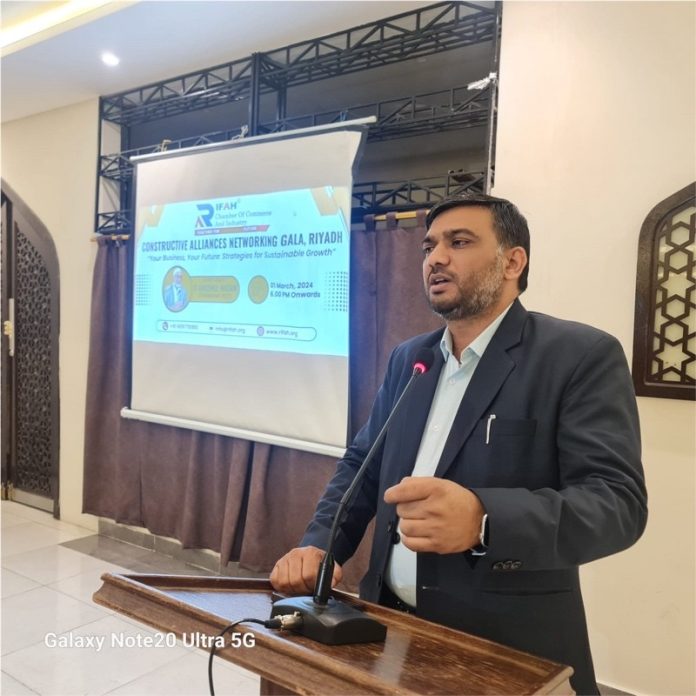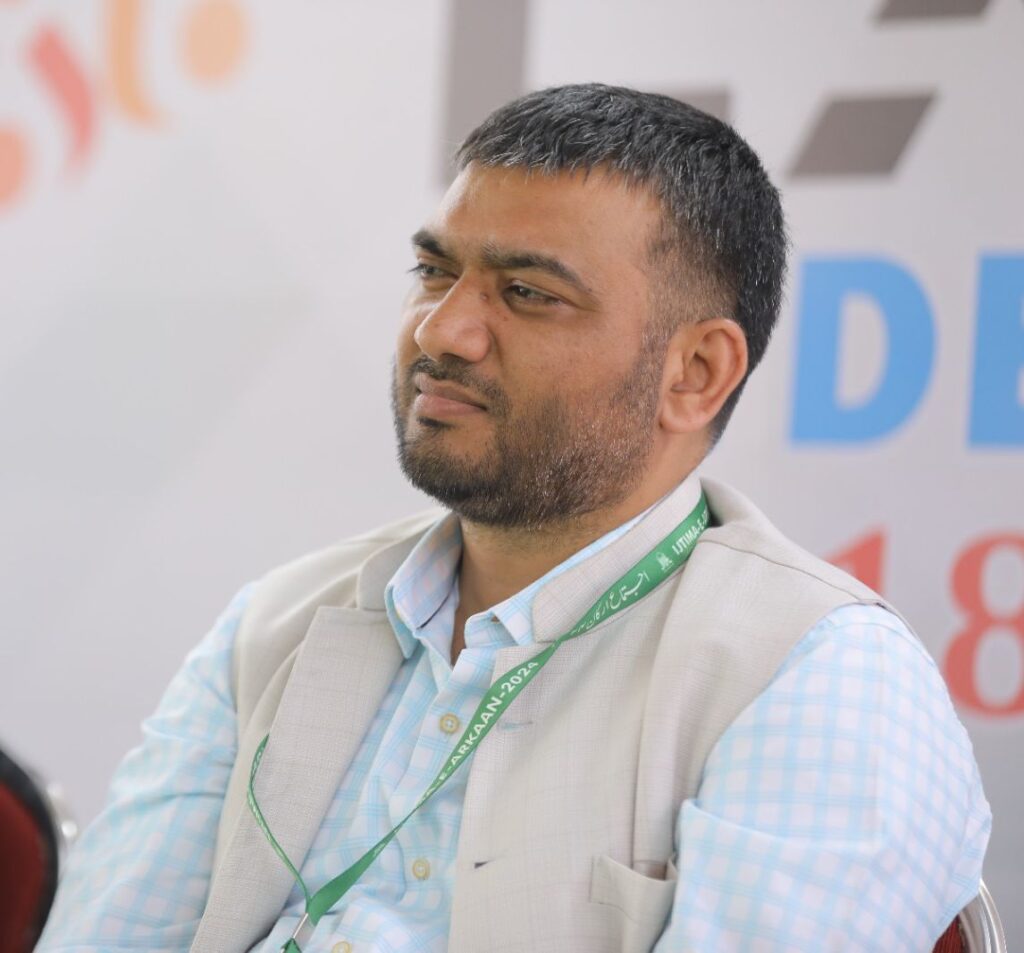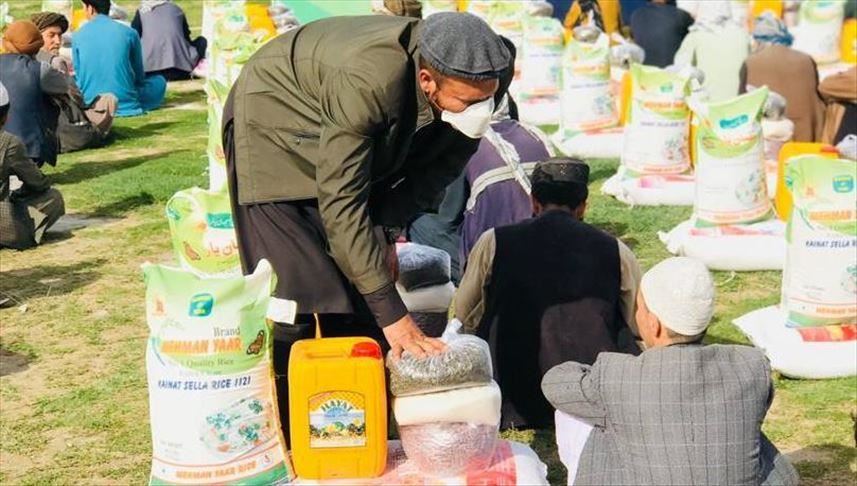Mumbai , MAHARASHTRA / Lucknow , UTTAR PRADESH :

In 2023, Riyadh was bustling with activity, its skyline shimmering with ambition and progress. It was here, amidst the city’s dynamic rhythm, that an unexpected journey began for me.
A gentleman added me to a WhatsApp group organised by RIFAH – a platform fostering entrepreneurship and collaboration. The group consisted of a team of businessmen travelling from India to attend the prestigious BIG5 Construct event in Saudi Arabia. My role? To guide and assist the team during their time in Riyadh, ensuring their experience was seamless and fruitful.
The days leading up to their arrival were filled with online discussions, meticulous planning, and an exchange of ideas. The more we interacted, the more my curiosity grew about meeting this group of Indian entrepreneurs in person. Among them, one name stood out – Dr. Mohd Aslam, the founder and CEO of Bakka Bags. His story, I had heard, was extraordinary: a Madrasa student turned BUMS doctor, now a thriving businessman.
When the team finally arrived in Riyadh, I eagerly met each member, but Dr. Aslam was nowhere to be found. I learned that, upon landing, he had immediately travelled to Dammam to visit relatives. The anticipation of meeting him only grew stronger.
The following day, our paths finally crossed. Dr. Aslam’s demeanour was calm yet commanding, his presence exuding both humility and confidence. In our brief but memorable meeting, I began to see glimpses of the journey that had brought him here – a journey of resilience, transformation, and boundless ambition. Little did I know that this encounter would inspire me to delve deeper into his incredible story, one that began in a small Madrasa and led to the bustling streets of Riyadh as a visionary entrepreneur.

Dr. Aslam was unlike any other businessman I had met. Down-to-earth and remarkably humble, he exuded simplicity in both his demeanour and approach. Despite not being a typical “Alig,” he proudly added “Alig” to his name, reflecting his deep connection to Aligarh Muslim University. Within a short span of time, our interactions grew meaningful, and we delved into discussions about his professional journey and his contributions to the Students Islamic Organisation (SIO) during his days at Chaukonia, Aligarh, and AMU.
What struck me most about Dr. Aslam was his genuine passion for balancing his professional success with community service. As I was preparing to re-start my writing journey focusing on young entrepreneurs, I knew his story had to be the first chapter. Our initial conversations laid the groundwork, but it wasn’t until a year later, in 2024, when I returned to India, that we explored his inspiring journey in greater detail.
From Madrasa to University
Dr. Aslam’s educational journey began with home-schooling and continued at Jamia Misbahul Uloom Chaukonia (Siddharth Nagar) branch of Jamiatul Falah, a renowned madrasa in Uttar Pradesh. Here, he gained a strong foundation in Islamic education, actively participated in extracurricular activities, and demonstrated his leadership skills as the editor of the madrasa’s students magazine.
In 2005, he took a significant step forward by enrolling in the Bachelor of Unani Medicine and Surgery (BUMS) programme at AMU. The transition from a traditional madrasa to the dynamic environment of AMU marked a transformative phase in his life. At AMU, he not only pursued academic excellence but also deepened his commitment to creating opportunities for others, laying the groundwork for his future entrepreneurial ventures.
This seamless blend of traditional and modern education shaped Dr. Aslam’s vision and resilience, qualities that would later define his remarkable journey as an entrepreneur and leader.
From AMU to Entrepreneurship
During his time at AMU, Dr. Aslam ventured into student politics, participating in the union election. Though he lost the battle, the experience enriched his understanding of leadership and resilience. Balancing academics and a budding entrepreneurial spirit, Dr. Aslam avoided asking his parents for financial support. Instead, he ventured into selling locks, mobile phones, and other small items. While his lack of business experience led to some losses, these early challenges became valuable lessons in perseverance and adaptability.
Despite the demands of running a side business, Dr. Aslam remained committed to his education. Balancing the two was a challenging feat, but his determination saw him through. In 2011, he completed his BUMS degree and began a six-month internship at a district hospital in Lucknow. It was during this phase of his life that he got married, a significant milestone that brought new responsibilities. For the remaining six months of his internship, he returned to AMU Hospital in Aligarh, continuing to hone his medical skills.
By the end of his internship, Dr. Aslam made a pivotal decision – to forgo higher education in medicine and explore new opportunities. This decision took him on a journey to Mumbai and eventually to Pune, where he enrolled at Symbiosis International University for a one-year postgraduate diploma in Emergency Medical Services (PGDEMS).
This period of his life marked a transition, where he began to blend his medical knowledge with his growing interest in entrepreneurship. The challenges he faced and the decisions he made during these formative years laid the foundation for his future as a successful businessman. Dr. Aslam’s journey is a testament to resilience, adaptability, and the courage to carve one’s path, even in the face of uncertainty.
Breaking Boundaries – The Unconventional Path
After completing his education and internship, Dr. Aslam, along with his wife – also a BUMS graduate – took the bold step of starting a clinic in Mumbai. For six months, they worked tirelessly to serve their patients, but the experience brought ethical dilemmas. Dr. Aslam and his wife were adamant about avoiding malpractices that had seeped into the profession, such as commissions and unethical practices. Staying true to their values, they decided to close the clinic.
However, the closure wasn’t just about ethics. During his time at AMU, Dr. Aslam had developed a strong desire to create employment opportunities for youth, especially in Uttar Pradesh, where unemployment remained a persistent issue. While a clinic could eventually provide such opportunities by growing into a hospital, the process would take years, and the impact would be limited. Driven by this vision of empowering deserving young people through meaningful work, Dr. Aslam made the bold decision to pivot entirely.
He chose to venture into business – a field neither related to his medical education nor rooted in his family’s legacy. It was an uncharted territory, and many saw it as an odd choice. While his wife and brother supported his decision, his father was deeply disappointed. For his father, leaving the noble profession of medicine for business seemed like a step backward, even a betrayal of the path Dr. Aslam had worked so hard to achieve.
Despite this opposition, Dr. Aslam stood firm. His conviction to create a larger social impact through business outweighed the personal and societal expectations tied to his identity as a doctor. This marked the beginning of an extraordinary journey, one that would see him transition from a healer of individuals to a creator of opportunities, taking bold risks to transform lives on a larger scale.
Building Dreams from Scratch
Dr. Aslam’s journey into entrepreneurship began with a bold and unconventional decision: venturing into the manufacturing of trolley bag shells. With no prior experience in business and a dream to create employment opportunities, he poured his heart, soul, and resources into setting up a factory. But reality struck hard. The business suffered massive losses, leaving him burdened with debts and no easy way to turn back.
There were moments of doubt when the thought of returning to the medical profession crossed his mind. Yet, the passion to create jobs and uplift others anchored his resolve. Instead of giving up, Dr. Aslam embarked on a relentless quest for self-improvement. He spent four months scrutinising every mistake, analysing every decision, and making necessary corrections. It was a period of sleepless nights, unyielding effort, and an unshakable belief that his vision could become a reality.
The tide eventually turned. Slowly but surely, the business began to generate profits, marking the start of his success story. The first tangible milestone came 1.5 years later when he purchased his first scooter – a modest yet deeply symbolic achievement. Those who had once criticised his decision to leave medicine and venture into business began to change their opinions, acknowledging the fruits of his perseverance.
From that point, there was no looking back. As the business grew, so did its footprint. From a small 720-square-foot facility, the operation expanded to a 1200-square-foot space in Mumbai East. The journey didn’t stop there; it scaled further to 2400 square feet and eventually to a 3600-square-foot factory. Each expansion was a testament to Dr. Aslam’s determination, resilience, and unwavering commitment to his mission.
Today, his factory stands not only as a symbol of his entrepreneurial success but also as a beacon of hope and opportunity for others – a dream fulfilled through sheer grit and a passion to make a difference. Dr. Aslam’s journey from a struggling start to a thriving business is a story of perseverance, vision, and the courage to defy the odds.
From Businessman to Author then to Mentor
In 2018, while managing his trolley bag manufacturing business, Dr. Aslam ventured into another entrepreneurial endeavour. This second business, which he later handed over to his younger brother, marked another milestone in his journey. Around this time, Dr. Aslam’s association with RIFAH began, a decision that would profoundly shape his trajectory.
Before the onset of the COVID-19 pandemic, he joined RIFAH, a platform for business networking and mentorship. Post-pandemic, he became more active in the organisation and eventually rose to the position of President for Maharashtra state. Under his leadership, RIFAH became a powerful catalyst for his personal and professional growth. Dr. Aslam began exploring international markets, travelling to the UAE, Saudi Arabia, and China to expand and diversify his business ventures.
One of the most pivotal pieces of advice he received during this phase came from experienced business leaders: to hire a consultant to streamline and enhance his operations. Initially, he signed a 12-month contract with a business consultant. Seeing the significant improvements, it brought to his business, he extended the contract for another year. During these two years, Dr. Aslam not only improved his business acumen but also learned strategies and insights that transformed the way he approached entrepreneurship.
Recognising the value of these lessons, Dr. Aslam felt a deep urge to share them with others. “What I’ve learned,” he thought, “should be accessible to every businessman and entrepreneur.” This realisation led him to channel his experiences and knowledge into writing. The result was 30 Business Hacks, a practical guide filled with key strategies and lessons from his journey. The book, written in both English and Hindi, became a testament to his mission of empowering others through knowledge.
Dr. Aslam’s evolution from a struggling entrepreneur to a successful businessman and mentor highlights his unrelenting drive to not only build his own ventures but also inspire and uplift others in the entrepreneurial community. His journey stands as an example of how resilience, learning, and the willingness to share can create ripples of positive change.
BAKKA: A Brand Born of Vision and Persistence
For years, Dr. Mohd Aslam focused on manufacturing raw materials for the luggage industry, quietly building his expertise in the sector. But he wasn’t content to remain behind the scenes. A bold vision began to take shape: creating his own brand of luggage. With this in mind, he registered the name “BAKKA” and launched his very own line of bags.
The journey didn’t stop there. Recognising the potential for growth, Dr. Aslam expanded his operations to include the manufacturing of other accessories used in the luggage industry. This diversification not only brought stability to the business but also ensured its sustainability. Within a short span of time, BAKKA became synonymous with quality and reliability, steadily carving its niche in a competitive market.
To support this growth, Dr. Aslam established a dedicated manufacturing unit in Lucknow for bag production. His two younger brothers took charge of managing the unit, embodying the values of trust and collaboration that he held dear. Dr. Aslam didn’t just involve his immediate family; he became a source of inspiration for his cousins, friends, and even the local youth. Through his own story, he demonstrated that entrepreneurship begins with small steps and can lead to extraordinary achievements.
What started as a one-man operation with a single employee has now grown into a thriving team of 20 dedicated individuals. For Dr. Aslam, this team isn’t just a workforce; they’re family. Together, they’ve built a business rooted in shared goals, mutual respect, and a collective drive for excellence.
Dr. Aslam’s journey with BAKKA is more than a business success story; it’s a movement. From motivating his relatives to guiding general youth, he’s on a mission to show that with determination, resilience, and the right mindset, anyone can transform a small idea into something remarkable. As BAKKA continues to grow, so does Dr. Aslam’s dream of empowering others to embark on their own entrepreneurial journeys and achieve greatness.
This remarkable blend of intellect, humility, and dedication to community welfare makes Dr. Aslam’s story one of inspiration – a journey that began in the quiet corridors of a Madrasa and led to the world of entrepreneurship, where he now stands as the founder and CEO of Bakka Bags.
Dr. Aslam’s journey began as a solitary endeavour, driven by a vision that extended far beyond personal success. With unwavering determination and a commitment to ethical principles, he laid the foundation for a small empire that would stand as a testament to his resilience and purpose. However, his journey was never just about his own achievements; it was equally about empowering others to realise their potential.
One such story reflects his profound impact. Dr. Aslam guided an aspiring entrepreneur to launch a business, which today provides employment to over 16 individuals. This is just one of many lives he has touched. Through mentorship and support, he has been instrumental in nurturing numerous start-ups and young entrepreneurs, enabling them to transform their dreams into reality. His legacy is not merely in the empire he built but, in the lives, he uplifted and the ripple effect of opportunity he created for generations to come.
source: http://www.radiancenews.com / Radiance News / Home> Entrepreneurship> Features> Focus / by Syed Azharuddin, Radiance News Bureau / January 01st, 2025













